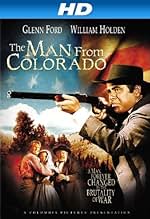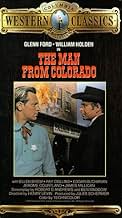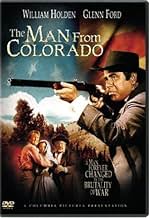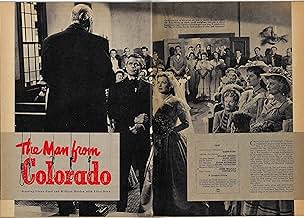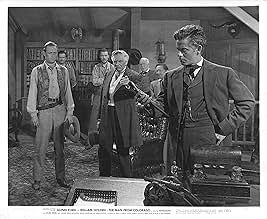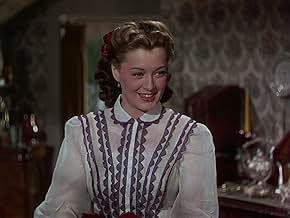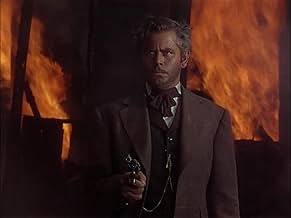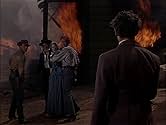AVALIAÇÃO DA IMDb
6,6/10
2,1 mil
SUA AVALIAÇÃO
No final da Guerra Civil, dois amigos regressam a casa no Colorado e um deles mudou e é violento e errático.No final da Guerra Civil, dois amigos regressam a casa no Colorado e um deles mudou e é violento e errático.No final da Guerra Civil, dois amigos regressam a casa no Colorado e um deles mudou e é violento e errático.
- Direção
- Roteiristas
- Artistas
- Prêmios
- 1 indicação no total
William 'Bill' Phillips
- York
- (as Wm. 'Bill' Phillips)
Stanley Andrews
- Roger MacDonald
- (não creditado)
Emile Avery
- Townsman
- (não creditado)
Walter Bacon
- Townsman
- (não creditado)
Walter Baldwin
- Tom Barton
- (não creditado)
Symona Boniface
- Matron
- (não creditado)
Chet Brandenburg
- Party Guest
- (não creditado)
James Bush
- Cpl. Dixon
- (não creditado)
Nora Bush
- Townswoman
- (não creditado)
Boyd Cabeen
- Townsman
- (não creditado)
- Direção
- Roteiristas
- Elenco e equipe completos
- Produção, bilheteria e muito mais no IMDbPro
Avaliações em destaque
Back in the day William Holden and Glenn Ford both had a unique contractual arrangement with Columbia Pictures. When unknown Bill Holden was up for the lead in Golden Boy, Harry Cohn cast him in return for Paramount selling 50% of his services to Columbia. Holden served two studio masters at the time he was making The Man from Colorado and would for another decade.
Glenn Ford was Columbia's bread and butter leading man at the time and right after The Man From Colorado, Cohn sold half of Ford's contract to MGM and Ford also had two studio masters.
What it meant for these two was that all projects had to be cleared through both studios and that Holden and Ford if they did an outside loan out would also have to be cleared from both. Not that their respective studios didn't keep both these guys very busy.
Holden and Ford had done a well received western, Texas, for Columbia back in 1941. Texas was a rather lighthearted film about two cowboys turning to different sides of the law in post Civil War Texas, though it did feature the death of one of them.
The Man from Colorado is also a story about the activities of Union Army war veterans. But The Man from Colorado doesn't have any light moments whatsoever. It's pretty grim tale about one of them developing a real taste for sadism and killing as a result of the war.
Ford's the sadist here, it's one of the few villain parts he ever did and it works I think because he is so against type. He did very few parts like this, Lust for Gold is another, but his public wouldn't accept him in these roles.
Some of the town businessmen led by Ray Collins just look at the war record and decide Ford would make one fine federal judge. A real law and order type. They get a lot more than they bargain for.
In Texas Holden had the showier role of the young cowboy who take the outlaw route. Here however he's the best friend who stands by his former commanding officer even though he both sees the man has issues and Holden loses Ellen Drew to Ford. Holden takes the outlaw path after giving up his marshal's job when Ford starts running roughshod over due process.
The other really standout performance in this film is that of James Milliken who plays one of Ford's former soldiers who turns outlaw and in fact humiliates him in one of the few funny moments in The Man From Colorado. Ford conceives a burning hate for him that results in tragedy all around.
Ford and Holden were considering another joint project in 1981 when Holden died. I would like to have seen that one come to pass.
Try to see The Man From Colorado back to back with Texas.
Glenn Ford was Columbia's bread and butter leading man at the time and right after The Man From Colorado, Cohn sold half of Ford's contract to MGM and Ford also had two studio masters.
What it meant for these two was that all projects had to be cleared through both studios and that Holden and Ford if they did an outside loan out would also have to be cleared from both. Not that their respective studios didn't keep both these guys very busy.
Holden and Ford had done a well received western, Texas, for Columbia back in 1941. Texas was a rather lighthearted film about two cowboys turning to different sides of the law in post Civil War Texas, though it did feature the death of one of them.
The Man from Colorado is also a story about the activities of Union Army war veterans. But The Man from Colorado doesn't have any light moments whatsoever. It's pretty grim tale about one of them developing a real taste for sadism and killing as a result of the war.
Ford's the sadist here, it's one of the few villain parts he ever did and it works I think because he is so against type. He did very few parts like this, Lust for Gold is another, but his public wouldn't accept him in these roles.
Some of the town businessmen led by Ray Collins just look at the war record and decide Ford would make one fine federal judge. A real law and order type. They get a lot more than they bargain for.
In Texas Holden had the showier role of the young cowboy who take the outlaw route. Here however he's the best friend who stands by his former commanding officer even though he both sees the man has issues and Holden loses Ellen Drew to Ford. Holden takes the outlaw path after giving up his marshal's job when Ford starts running roughshod over due process.
The other really standout performance in this film is that of James Milliken who plays one of Ford's former soldiers who turns outlaw and in fact humiliates him in one of the few funny moments in The Man From Colorado. Ford conceives a burning hate for him that results in tragedy all around.
Ford and Holden were considering another joint project in 1981 when Holden died. I would like to have seen that one come to pass.
Try to see The Man From Colorado back to back with Texas.
Best friends Owen and Del, along with local men, are mustered out of the Union army at Civil War's end. Trouble is Big Ed has grabbed the men's gold-bearing land while the men were gone, and now, as a judge, Owen has to enforce the law in Big Ed's favor. This splits the community into warring factions.
Gritty, character-driven western. We know at outset that Owen (Ford) is a flawed character when his Union detachment shells surrendering Johnny rebs. In fact, Owen hides his killer instinct behind an uptight rendering of authority, whether as a colonel or as a federal judge. Ford plays the authoritarian part so grimly (count the smiles—I stopped at zero), it's hard to see how the charming Caroline would be attracted to him. Nonetheless, the interplay between best-friends Ford and Holden is involving and forms the story's core. Alliances between the various factions are sometimes hard to keep up with, but are more unpredictable than usual. And I especially like that final maneuvering around the bridge that I didn't see coming.
Columbia Studios popped for a lot of extras, along with fine special effects, especially when the burning wall comes down. Funny, though, how mountainous Colorado looks like greater LA. Too bad Columbia didn't pop for sending the crew at least to Lone Pine and the Southern Sierras. All in all, it's a very different kind of horse opera that avoids the usual clichés, with Ford at his absolute grimmest. Clearly, however, he and Holden are on their way up the Hollywood ladder.
Gritty, character-driven western. We know at outset that Owen (Ford) is a flawed character when his Union detachment shells surrendering Johnny rebs. In fact, Owen hides his killer instinct behind an uptight rendering of authority, whether as a colonel or as a federal judge. Ford plays the authoritarian part so grimly (count the smiles—I stopped at zero), it's hard to see how the charming Caroline would be attracted to him. Nonetheless, the interplay between best-friends Ford and Holden is involving and forms the story's core. Alliances between the various factions are sometimes hard to keep up with, but are more unpredictable than usual. And I especially like that final maneuvering around the bridge that I didn't see coming.
Columbia Studios popped for a lot of extras, along with fine special effects, especially when the burning wall comes down. Funny, though, how mountainous Colorado looks like greater LA. Too bad Columbia didn't pop for sending the crew at least to Lone Pine and the Southern Sierras. All in all, it's a very different kind of horse opera that avoids the usual clichés, with Ford at his absolute grimmest. Clearly, however, he and Holden are on their way up the Hollywood ladder.
Colorado was a large, booming territory in 1865. It did not enter the union until eleven years later, and as the only new state to get admission in 1876 it has the right to remain our "Centennial" State (for the centennial of the Declaration of Independence). In the Civil War there were few engagements in Colorado, but one that did stick out was a massacre (there is no other way of putting it) of Indians by a Colonel Chivington at Sands Creek. Chivington's daughter had been raped by an Indian, and he took advantage of a relatively mild act of legal disobedience by the Indians to kill a good number of them.
"The Man From Colorado" is not dealing directly with the Sands Creek Massacre (no Indians are involved in the story). Instead, Chivington's character is transferred to Glenn Ford, who in the closing days of the Civil War perpetrates a similar atrocity, this time on surrendering Confederates. Ford and his friend William Holden have been through the whole war together, but Holden has managed to retain a sense of balance despite the horrors he has seen. Ford is on a slippery slope. Even after the atrocity he is still aware of his act of cruelty and writes in his diary about it. He can't control himself anymore.
Unfortunately his war record stands him well with the richest men in the territory, especially Ray Collins. Collins has managed to get control of the claims that should be used to pay the ex-Union troops. He wants a strong man to be the Federal judge of Colorado territory. Who better than the no-nonsense Ford? So Ford gets the judicial position. Holden has lost his old girlfriend (Ellen Drew) to Ford, but he remains a friend. However he and Drew are increasingly aware of Ford's mental instability. So is everyone (except Ray Collins), as Ford keeps giving the most draconian decisions from the bench. In particular to his former soldiers, now fighting to get back their claims. This, of course leads to their becoming bandits. A vicious cycle, of course. Holden and Drew may be able to break it - Drew has seen Ford's diary.
In the wake of World War II's returning men, and the many suffering psychological trauma, "The Man From Colorado" was a timely film. Ford never played a psychotic type as well as here. Holden (actually in a supporting role - before his burst into super stardom) is a great balance to Ford. Rains performs well as do most of the cast. And by the time the holocaust unleashed by Ford's appointment to the bench is finished, even Ray Collins wishes he never was dumb enough to put this man on the bench.
"The Man From Colorado" is not dealing directly with the Sands Creek Massacre (no Indians are involved in the story). Instead, Chivington's character is transferred to Glenn Ford, who in the closing days of the Civil War perpetrates a similar atrocity, this time on surrendering Confederates. Ford and his friend William Holden have been through the whole war together, but Holden has managed to retain a sense of balance despite the horrors he has seen. Ford is on a slippery slope. Even after the atrocity he is still aware of his act of cruelty and writes in his diary about it. He can't control himself anymore.
Unfortunately his war record stands him well with the richest men in the territory, especially Ray Collins. Collins has managed to get control of the claims that should be used to pay the ex-Union troops. He wants a strong man to be the Federal judge of Colorado territory. Who better than the no-nonsense Ford? So Ford gets the judicial position. Holden has lost his old girlfriend (Ellen Drew) to Ford, but he remains a friend. However he and Drew are increasingly aware of Ford's mental instability. So is everyone (except Ray Collins), as Ford keeps giving the most draconian decisions from the bench. In particular to his former soldiers, now fighting to get back their claims. This, of course leads to their becoming bandits. A vicious cycle, of course. Holden and Drew may be able to break it - Drew has seen Ford's diary.
In the wake of World War II's returning men, and the many suffering psychological trauma, "The Man From Colorado" was a timely film. Ford never played a psychotic type as well as here. Holden (actually in a supporting role - before his burst into super stardom) is a great balance to Ford. Rains performs well as do most of the cast. And by the time the holocaust unleashed by Ford's appointment to the bench is finished, even Ray Collins wishes he never was dumb enough to put this man on the bench.
It begins at the end of the Civil War when a coward massacre takes place , fdealing with two Civil War vets at odds , as two friends return home to Colorado , one an honest marshall (William Holden) , the other a sadistic judge (Glenn Ford) has changed and is now violent and erratic. As two friends go their separate ways after Civil War , one leads an upright life as a sheriff , but the other corrupted by the war engages in a violent campaign to build his own law , and carrying out terrorisation . Colorado's wasn't big enough for both .. when a moan came between them ! .They Turned the West Into a Jungle of Male Killing Male for a Woman!
An odd , old but solid Technicolor Western fare about two friends return home after their discharge from the army after the Civil War , but one of them becomes an erratic , disturbing judge with quirky acting by Glenn Ford , while his friend decently acted by William Holden who desperately tries to find a way to help him. It begins as a sluggish , slow-moving Western with long ball scenes but follows to surprise us with complex characters , thrills , breathtaking patches and decent plot about two different friends ; as both of them end up on opposite sides of the law . The simple tale is almost rudimentary though full of clichés , as the engaging script lines too often settle for crude routine , at times . Suspense and tension builds over the time in which the outlaws and the starring await to take the final confrontation . The action is competently made , as when the nasties shoot and hang without remission and even fire a village . The highlights of the film are the scenes in which the strict judge exects his particular justice by hanging and the final facing off . William Holden provides a slighly laborious acting as new Marshal , but his interpretation is really eclipsed by the great Glenn Ford has had deep-rooted psychological damage due to his experiences during the war, and as his behavior becomes more and more insane . They're well accompanied by a good support cast , such as : Ray Collins , Edgar Buchanan , Jerome Courtland , James Millican, Stanley Andrews , among others .
The motion picture was well directed by Henry Levin . Ex-actor ,director Henry Levin was a previous stage player who had a prolific and long career as filmmaker entering the directing in 1943 about every genre over the next 36 years . His heyday was in the 1960s , when he turned out several bright and frothy sex comedies, notably ¨Belles on their toes , Come fly with me , Honeymoon hotel¨ , his greatest films were on the adventure genre as ¨Genghis Khan , The wonderful world of Brothers Grimm , The bandit of Sherwood Forest , The return of Monte Cristo and Journey to the center of the earth¨ . Although Levin's forte was light comedies, one of his most interesting films was a dark, brooding western ¨Lonely man¨ (1957) and ¨Desperados¨ , both of them with Jack Palance. He finished his career piloting made-for-television movies, and died on the final day of shooting Scout's Honor (1980) (TV). If you are looking for Westerns with action , violence but also story and atmospheric scenes The Man from Colorado(1948) should be for you.
An odd , old but solid Technicolor Western fare about two friends return home after their discharge from the army after the Civil War , but one of them becomes an erratic , disturbing judge with quirky acting by Glenn Ford , while his friend decently acted by William Holden who desperately tries to find a way to help him. It begins as a sluggish , slow-moving Western with long ball scenes but follows to surprise us with complex characters , thrills , breathtaking patches and decent plot about two different friends ; as both of them end up on opposite sides of the law . The simple tale is almost rudimentary though full of clichés , as the engaging script lines too often settle for crude routine , at times . Suspense and tension builds over the time in which the outlaws and the starring await to take the final confrontation . The action is competently made , as when the nasties shoot and hang without remission and even fire a village . The highlights of the film are the scenes in which the strict judge exects his particular justice by hanging and the final facing off . William Holden provides a slighly laborious acting as new Marshal , but his interpretation is really eclipsed by the great Glenn Ford has had deep-rooted psychological damage due to his experiences during the war, and as his behavior becomes more and more insane . They're well accompanied by a good support cast , such as : Ray Collins , Edgar Buchanan , Jerome Courtland , James Millican, Stanley Andrews , among others .
The motion picture was well directed by Henry Levin . Ex-actor ,director Henry Levin was a previous stage player who had a prolific and long career as filmmaker entering the directing in 1943 about every genre over the next 36 years . His heyday was in the 1960s , when he turned out several bright and frothy sex comedies, notably ¨Belles on their toes , Come fly with me , Honeymoon hotel¨ , his greatest films were on the adventure genre as ¨Genghis Khan , The wonderful world of Brothers Grimm , The bandit of Sherwood Forest , The return of Monte Cristo and Journey to the center of the earth¨ . Although Levin's forte was light comedies, one of his most interesting films was a dark, brooding western ¨Lonely man¨ (1957) and ¨Desperados¨ , both of them with Jack Palance. He finished his career piloting made-for-television movies, and died on the final day of shooting Scout's Honor (1980) (TV). If you are looking for Westerns with action , violence but also story and atmospheric scenes The Man from Colorado(1948) should be for you.
Glenn Ford was as good as anyone playing an intense psychotic, which he does here in this above-average western. Ford, playing "Col.Owen Devereaux," gets elected to the position of "judge" right after his distinguished career in the Civil War. Unfortunately, he has mental problems and this position carries too much weight for an unstable sort such as him to be carrying. His best buddy, "Capt. Del Stewart" (William Holden) sees his friend as he is and tries to reason with him and help him out but winds up being alienated, too, by the paranoid judge whose problems escalate as the story goes on.
There's not a tremendous amount of action in here, but it still moves pretty fast and looks really nice on DVD. This is one of the few color films of the 1940s.
Ellen Drew, Ray Collins and Ed Buchnan provide good supporting help in the story. If you like some of the Anthony Mann-James Stewart westerns of the late '40s/early '50s, you should like this one, too.
There's not a tremendous amount of action in here, but it still moves pretty fast and looks really nice on DVD. This is one of the few color films of the 1940s.
Ellen Drew, Ray Collins and Ed Buchnan provide good supporting help in the story. If you like some of the Anthony Mann-James Stewart westerns of the late '40s/early '50s, you should like this one, too.
Você sabia?
- CuriosidadesColumbia Pictures spent quite a bit on The Man in Colorado. At one point, the crew dynamited the side of a 1500-foot mountain in California's San Fernando Valley in order to create a deep gorge as called for by the script. And the western town they constructed was one of the largest location sets ever built by Columbia up to that time. During filming of a massive fire scene at the end, however, the set caught fire uncontrollably, and Holden and Ford tried to actually fight the fire until firemen could arrive. "Dad came away coated in black soot, with burns to his arms and hands," Ford's son Peter later wrote.
- Erros de gravaçãoMany of the men are wearing trousers with belt loops and belts. Belt loops were not added to men's trousers until the 20th century.
- Citações
Owen Devereaux: [voiceover as he writes in his diary] I killed a hundred men today. I didn't want to. I couldn't help myself. What's wrong with me? I'm afraid... afraid I'm going crazy.
- Cenas durante ou pós-créditosOpening credits are listed in the pages of a book being turned by a hand.
- ConexõesFeatured in Nobre Inimigo (1952)
- Trilhas sonorasWhen Johnny Comes Marching Home
(uncredited)
Written by Louis Lambert (pseudonym for Patrick Sarsfield Gilmore)
Played at the homecoming
Principais escolhas
Faça login para avaliar e ver a lista de recomendações personalizadas
- How long is The Man from Colorado?Fornecido pela Alexa
Detalhes
- Data de lançamento
- País de origem
- Idioma
- Também conhecido como
- The Man from Colorado
- Locações de filme
- Empresa de produção
- Consulte mais créditos da empresa na IMDbPro
Bilheteria
- Orçamento
- US$ 1.000.000 (estimativa)
- Tempo de duração
- 1 h 40 min(100 min)
- Cor
- Proporção
- 1.37 : 1
Contribua para esta página
Sugerir uma alteração ou adicionar conteúdo ausente


